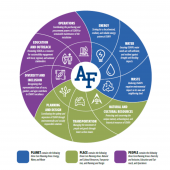
ABSTRACT: In this paper we offer an approach to sustainability-related education that can help students integrate the lessons they are learning in the classrooms to the type of real-world applications they will encounter in the workplace. We believe that by using our campus as a living-learning laboratory and engaging students in hands-on projects within a campus lab that directly contribute to one of their institution’s leading sustainability initiatives, we can unlock the highest levels of educational achievement and student satisfaction. We describe our course as intentionally designed because we have developed it with a specific purpose that goes beyond the stated learning objectives. Our course not only addresses recognized institutional and course-level educational outcomes, but also uses a community engagement approach that also directly supports important aspects of an enterprise-wide Sustainability Strategic Plan. We present relevant literature, highlight the significance of our approach to sustainability education, and describe its impact at our institution and in the community. We then offer detailed descriptions of our course’s activities, discuss lessons-learned and suggest future potential avenues of research and application. We hope this case study may prove to be an exemplar or a catalyst for other institutions of higher education as well as inspire further research aimed at improving sustainability education.
Continue Reading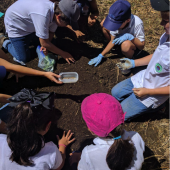
This article describes a sustainable agriculture workshop designed and led by Master’s students to support university-community engagement in Costa Rica. Our project had three transformative goals: 1) to empower Master’s students as educators, 2) to share food security knowledge with community youth, and 3) to strengthen our university-community relationships for knowledge dissemination. For other scholars who wish to apply principles from our Master’s student-led workshop within their local context, we describe our recommendations as well as areas for improvement regarding our three goals. Despite our workshop successes, it was a volunteer project that competed with the academic workloads of the students and the professor. We suggest that community engagement form part of regular academic obligations and courses to increase its accessibility and to provide more opportunities for Master’s students to transition into educators and practitioners before entering their fields of work.
Continue Reading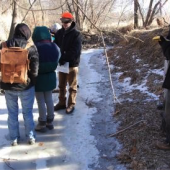
This case study describes a problem-based and service learning module in which undergraduate students participated in a community-based project. Students joined a group consisting of local non-governmental organizations (NGOs), public and private organizations, concerned citizens, and city officials to tackle issues concerning the local watershed. The case study took place over a number of years from 2014 to 2016 and will continue in subsequent academic years with a new group of multidisciplinary students.
Students put together documentation for a grant application that resulted in the city receiving $2.5 million dollars in grant money towards sustainable stormwater management systems. This aspect of the project included extensive data collection and analysis, much like the kind of work water conservationist in the field would perform. Students continued the work by using the data to plan and design appropriate, site-specific best management practices (BMPs) for the campus and in subsequent courses will implement these designs on site.
The mode of instruction described in this case study proved quite engaging to the students because it put them in the heart of an actual local project, doing work that was removed from a purely academic exercise – thereby offering a real-world scenario as field employees. The goal is to provide hands-on instruction that inspires and engages students and allows them to apply concepts of watershed management as a service to their local community.
Chronicling a semester-long civic engagement project, this essay explores the efforts of a senior seminar course to collaborate with a local wilderness preservation organization. The essay reflects on the role of students in their communities, their connections to wilderness, and the challenges and rewards of civic engagement.
Continue Reading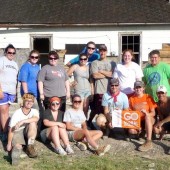
After Hurricane Katrina devastated parts of the Gulf Coast, Susquehanna University (SU) responded by launching the Hurricane Relief Team (HRT) program. In the past six years, SU has sent 16 teams of 15-20 students each and the program has evolved from a basic volunteer service opportunity into a service-learning experience and later into a two-week, cross-cultural service-learning program. While this study is not designed to determine whether participation in HRT, as a specific program, impacted graduation rates, it is intended to provide support for the correlation between civically engaged students and persistence to graduation. Through this example of a cross-cultural, service-learning program, the examination of graduation rates of HRT participants provides evidence of the potentially transformative nature of the experience as derived from historical data.
Continue Reading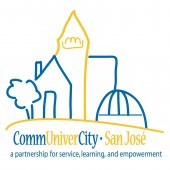
Experiential learning, and more specifically, service learning (SL) can serve as an ideal mechanism to support sustainability education. In particular, because of its emphasis on collaboration between students, faculty, and the community partner(s) and on social change and civic engagement, SL provides an excellent vehicle to address issues related to social justice. In this article, we document a unique SL partnership at San José State University—CommUniverCity. CommUniverCity’s primary mission is to build social capital and empower residents in an underserved community near the university. Each year, students, faculty and residents invest more than 21,000 hours in service to the community. Because of its unique mission, sustainability-related projects lie at the heart of what CommUniverCity does. We analyze student surveys from more than 30 classes engaged in SL projects during 2012 across a wide range of disciplines. All projects address at least one, and often multiple “Es” of sustainability. Our findings indicate that students find value in the SL experience, not only in terms of better understanding of the course subject matter, but also in terms of their understanding of “community” and the larger issue of social justice and equity.
Continue Reading